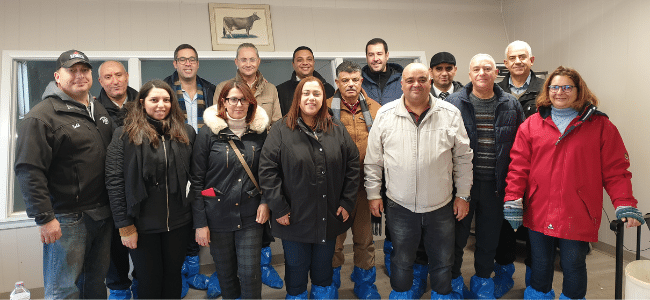This is the second in a series of stories featuring outside institutions with which the U.S. Grains Council (USGC) works to accomplish its mission of developing markets, enabling trade and improving lives. Look for additional stories in upcoming issues of Global Update.
The Northern Crops Institute (NCI) is a collaborative effort led by Minnesota, Montana, North Dakota and South Dakota to support the promotion and market development of crops grown in this four-state region. Through its partnership with NCI, the U.S. Grains Council’s (USGC’s) international customers and stakeholders have a pathway to acquire and develop food products for end users who desire them.
Housed on the campus of North Dakota State University in Fargo, North Dakota, NCI operates a meeting and learning center that brings together international customers, commodity traders, technical experts and processors for discussion, education and technical services related to the use of U.S. feed grains, wheat, soybeans and oilseeds and value-added products.
“NCI’s facilities and staff – including hands-on training facilities in feed milling, food production and grain procurement – have made them an ideal partner for USGC to work with over the years,” said Cary Sifferath, USGC senior director of global programs. “I’ve taken part in several training programs we’ve co-hosted with NCI for our international customers and have seen firsthand how this cooperative relationship has helped build export markets for U.S. grains and grain co-products.”
The COVID-19 pandemic threatened to throw a wrench into NCI’s training programs, but like those at the Council, NCI staff members were able continue offering innovative training sessions in a virtual format, including several for which the Council helped gather many international attendees.
r webinars connected with over 1,000 people from 55 countries in 2020, and we’re on pace to more than double that number in 2021,” said Mark Jirik, NCI’s director. “Our online courses brought in a wider range of people from a wider range of countries but still focused on helping our global buyers develop better feed and food products for their customers. We were fortunate to bring on an ag education expert to help us make the adjustments from in person to online. The methods for teaching online are not the same as in person, and those changes helped us be successful in organizing and delivering key messages.”
Last September, NCI and USGC held a two-week virtual training for new and upcoming leaders of six major feed and grain buyers across the Middle East and North Africa (MENA) region. The course included lectures and tours to provide market intelligence and marketing information to feed grain buyers and end-users, which helps the Council build strong relationships with key regional corn importers.
Other projects the two organizations have worked on together include research with Auburn University to evaluate the effect of corn origin on broiler performance as well as digital courses like Healthy Solutions for Food Barley and Barley to Beer.
An NCI survey conducted prior to the pandemic concluded that after attending NCI courses, 33 percent of participants purchased U.S. corn and 24 percent purchased U.S. barley.
While virtual events have been successful, Jirik said the organization looks forward to hosting in-person sessions once it’s safe to do so.
“NCI is excited to host in-person course participants back to the U.S. when global travel opens up again. At the same time the webinars, online courses, videos and handbooks won’t be going away either. Our hope is that we can create a coordinated effort across multiple forms to live up to our mission of expanding markets for crops for feed, energy and food.
“NCI and USGC have a long history of developing markets, and both organizations are focused on quality and adding value. Without USGC, and their relationships with buyers, the education – and the results – would not be possible.”
About The U.S. Grains Council
The U.S. Grains Council develops export markets for U.S. barley, corn, sorghum and related products including distiller’s dried grains with solubles (DDGS) and ethanol. With full-time presence in 28 locations, the Council operates programs in more than 50 countries and the European Union. The Council believes exports are vital to global economic development and to U.S. agriculture’s profitability. Detailed information about the Council and its programs is online at www.grains.org.

